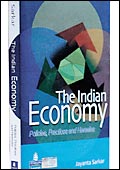 |
THE AGE OF FALLIBILITY
By George Soros
Public Affairs
Pp: 259
Price: Rs 1,023 |
Of
the half-a-dozen or so books that George Soros has written, there's
only one (The Alchemy of Finance) devoted to the controversial
speculator's investment secrets. All the others address larger
issues such as globalisation, capitalism, democracy and communism.
The statistic is important because it tells you something about
the man: He sees himself more as a crusader than a famous and
rich financial market investor. That should make Soros, born in
Hungary in 1930 as Gyorgy Schwartz, the only one of his kind.
For example, Warren Buffett, far wealthier stock investor than
Soros, champions no significant political cause, keeps a low profile,
and certainly hasn't been accused of trying to bring down any
institution (Soros, in contrast, is often called the "man
who broke the Bank of England", for profiting from Britain's
currency crisis of 1992).
Yet, if Soros is anything, he's not apologetic.
He doesn't feel embarrassed by his riches or even his aggressive
political agendas, and he expects people to believe him when he
says that "my goal is to make the world a better place".
Over the years, starting the late 70s, Soros has been putting
his money where his mouth is, helping topple governments, build
democratic institutions and, of late, chase us President George
Bush out of office. In fact, his previous book, The Bubble of
American Supremacy, was a scathing attack on how Bush had managed
to lead America astray. Soros agrees that the world changed after
9/11, but believes that Bush made it worse with his so-called
war on terror.
So, how is The Age of Fallibility different
from his previous books? To put it simply, it's a rethink-not
on the fundamental issues, but on one important count: the American
open society. Bewildered and frustrated by the American voter's
decision to reelect Bush, Soros wants to figure out why the average
American has been unable to see that Bush's war on terror has
disastrous consequences for the country and the world in general.
His conclusion:"The message is simple: America cannot remain
powerful and prosperous as a feel-good society. We must learn
to confront unpleasant realities if we want to remain leaders
in the world...it is not enough to change governments; our attitudes
and policies need to be thoroughly reconsidered."
It isn't easy to get your arms around this
book. The first part, where Soros talks about thinking and reality
and open society, is especially tricky, and he tends to repeat
himself several times. But there's no mistaking the importance
of Soros' message. The world has become a far more unstable place
in the wake of 9/11, and the citizens of the world have to act
now to keep it from spiralling into destruction.
 |
THE INDIAN ECONOMY
By Jayanta Sarkar
Pearson Longman
Pp: 311
Price: Rs 575 |
At
a time when the government is withdrawing from business, Jayanta
Sarkar, in his book The Indian Economy, offers a contrarian view.
His arguments hinge on a simple premise-that the ills of Capitalism
are reason enough for Socialism to make a comeback.
Sarkar liberally uses this principle to describe
his 'alternate models'. He suggests that government should get
into the procurement business with a vengeance-become a clearing
house for all commodities. This, he argues, will find favour with
the consumer and the primary seller (say, the farmer or artisan),
since the latter reposes greater faith in the public sector.
On the fiscal front, the author finds a rather
escapist solution to the issue of tax evasion-offer a tax rebate
on disclosure of black money. However, the author's concerns on
health and education issues and the lack of adequate government
focus on these sectors is noteworthy. His prescriptions are more
reasonable on these issues-special administrative back up and
also larger funds.
The contrarian nature of the book registers
a spike on another front-role of agriculture in the Indian economy.
The author maintains that India will 'essentially' remain an agricultural
country, deriving his conviction from the country's 'ageless ethos,
social matrices'. Surely, the book best brings out Sarkar's patriotism.
-Balaji Chandramouli
|






